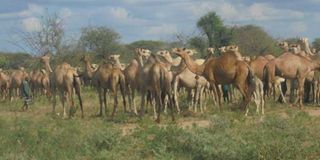Farmers count loses as hundreds of camels invade farms in Kitui

A Somali herder with his camels in Kathungu, Mwingi East, Kitui County on Friday March 4, 2016. The animals invaded farms in Ukasi causing massive destruction of crops. PHOTO | BENEDICT MUTUKU | NATION MEDIA GROUP
What you need to know:
- Nation.co.ke established that between 400 and 500 camels were impounded by Friday afternoon but no herder was arrested.
- Mr Jones Nzomo Munyithya told journalists that herders had been grazing in their farms for a week before the Friday drive-out bid.
- The camels were taken to Kathungu near the Sosoma junction.
- But in a dramatic twist, a group of charged Somali herders raided the area and drove away the animals after allegedly bribing two police officers
Tension has gripped a village in Kitui County after hundreds of camels invaded farms in the area leading to massive destruction of crops.
Somali herders are reportedly making a return to Kitui especially in Ukasi, Mwingi East District near the volatile border of Tana River and Kitui counties.
This comes even as the government spent Sh6 million mid-2015 in a police operation that was aimed at driving illegal herders and bandits out of Kitui County.
On Friday police officers accompanied by farmers carried out an operation that lasted nearly five hours to remove illegal herders and their camels.
Nation.co.ke established that between 400 and 500 camels were impounded by Friday afternoon but no herder was arrested.
Mr Jones Nzomo Munyithya, who is a farmer in Ukasi, told journalists that herders had been grazing in their farms for a week before the Friday drive-out bid.
“Camels have been moving around our farms. We have tried to confront the herders but they said the land was public and nothing would prevent them from grazing here,” said Mr Munyithya.
The camels were taken to Kathungu near the Sosoma junction but in a dramatic twist, a group of charged Somali herders raided the area and drove away the animals after allegedly bribing two police officers who were left guarding the camels.
The locals immediately blamed the police accusing them of colluding with the herders in what they said could be a conspiracy to help them evade the law.
“Even after detaining the animals the police have mysteriously allowed the herders to take them away. The officers are reluctant to follow them and we fear the animals could get back into our farms and cause more destruction,” Mr Munyithya said.
NOT AWARE OF INVASION
But Mwingi East police boss Gideon Mugambi said he was not aware of any camel invasion in the area.
“I have not received any report of that sort. I have even called the Ukasi OCS a while ago and he has not informed me about anything concerning camels,” Mr Mugambi told the Nation by phone.
He denied that police officers had been involved in the Friday operation.
“We did not send any officer to conduct any operation. Those who are claiming their farms were invaded should first report to us but we have not received any complaint yet,” the OCPD said.
However, residents expressed fears that the return of the herders in the area could re-ignite the perennial conflict between the two communities living along the banditry and insecurity-prone border.
“We want the national government to beef up security in the areas along the border so that our farms can be safe. The damage we have incurred so far is huge and irreversible,” Mr Munyithya said.
In 2015, eight people were killed as retaliatory attacks ensued between the farmers and pastoralists over water and pasture in Ngomeni, Ukasi and Mutha.
Mr Munyithya said for more than four decades, Kitui residents have been suffering in the hands of the pastoralists from North Eastern who make their way into the region through the neighbouring Tana River.
And even as he asked the national government to work on an immediate and long lasting move to drive away the herders, Mr Munyithya lamented that their cattle risked being infected with “strange” diseases if the camels continued grazing in the area.




